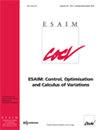退化噪声驱动下Kuramoto-Sivashinsky方程的不可约性
IF 1.2
3区 数学
Q4 AUTOMATION & CONTROL SYSTEMS
Esaim-Control Optimisation and Calculus of Variations
Pub Date : 2022-02-15
DOI:10.1051/cocv/2022014
引用次数: 0
摘要
本文研究了仅作用于有限个傅立叶模态的加性噪声驱动的Kuramoto-Sivashinsky方程的不可约性。为了获得不可约性,我们首先研究了有限维力驱动下Kuramoto-Sivashinsky方程的近似可控性,并基于Agrachev-Sarychev型几何控制方法进行了证明。其次,我们研究了确定性Kuramoto-Sivashinsky方程解算子的连续性。最后,结合求解算子的近似可控性和连续性,建立了Kuramoto-Sivashinsky方程的不可约性。本文章由计算机程序翻译,如有差异,请以英文原文为准。
Irreducibility of Kuramoto-Sivashinsky equation driven by degenerate noise
In this paper, we study irreducibility of Kuramoto-Sivashinsky equation which is driven by an additive noise acting only on a finite number of Fourier modes. In order to obtain the irreducibility,
we first investigate the approximate controllability of Kuramoto-Sivashinsky equation driven by a finite-dimensional force, the proof is based on Agrachev-Sarychev type geometric control approach.
Next, we study the continuity of solving operator for deterministic Kuramoto-Sivashinsky equation. Finally, combining the approximate controllability with continuity of solving operator,
we establish the irreducibility of Kuramoto-Sivashinsky equation.
求助全文
通过发布文献求助,成功后即可免费获取论文全文。
去求助
来源期刊

Esaim-Control Optimisation and Calculus of Variations
Mathematics-Computational Mathematics
自引率
7.10%
发文量
77
期刊介绍:
ESAIM: COCV strives to publish rapidly and efficiently papers and surveys in the areas of Control, Optimisation and Calculus of Variations.
Articles may be theoretical, computational, or both, and they will cover contemporary subjects with impact in forefront technology, biosciences, materials science, computer vision, continuum physics, decision sciences and other allied disciplines.
Targeted topics include:
in control: modeling, controllability, optimal control, stabilization, control design, hybrid control, robustness analysis, numerical and computational methods for control, stochastic or deterministic, continuous or discrete control systems, finite-dimensional or infinite-dimensional control systems, geometric control, quantum control, game theory;
in optimisation: mathematical programming, large scale systems, stochastic optimisation, combinatorial optimisation, shape optimisation, convex or nonsmooth optimisation, inverse problems, interior point methods, duality methods, numerical methods, convergence and complexity, global optimisation, optimisation and dynamical systems, optimal transport, machine learning, image or signal analysis;
in calculus of variations: variational methods for differential equations and Hamiltonian systems, variational inequalities; semicontinuity and convergence, existence and regularity of minimizers and critical points of functionals, relaxation; geometric problems and the use and development of geometric measure theory tools; problems involving randomness; viscosity solutions; numerical methods; homogenization, multiscale and singular perturbation problems.
 求助内容:
求助内容: 应助结果提醒方式:
应助结果提醒方式:


